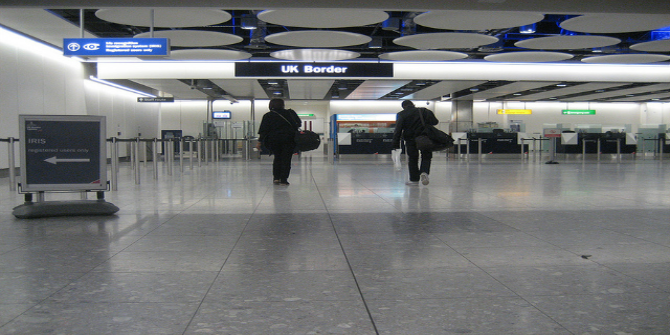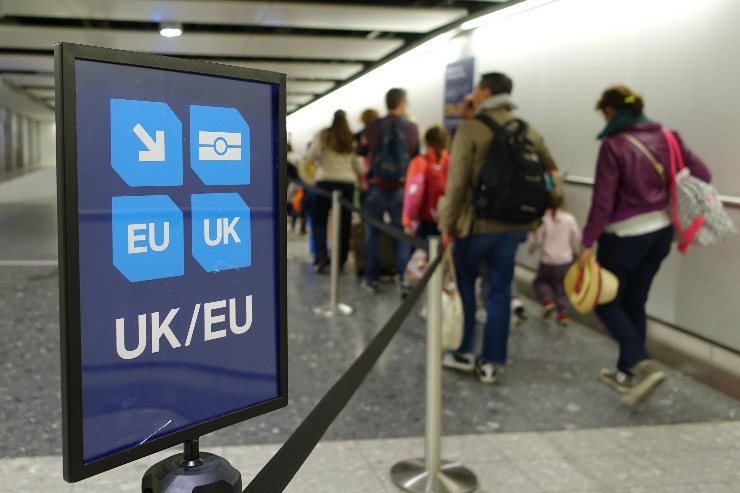 Perceived threats to one’s national identity can explain a lot more about why people worry about the impact of immigration. In particular, those who identify with their country in an ethnic-cultural sense are more negative to immigration than those who have a civic national identity. Clara Sandelind explains.
Perceived threats to one’s national identity can explain a lot more about why people worry about the impact of immigration. In particular, those who identify with their country in an ethnic-cultural sense are more negative to immigration than those who have a civic national identity. Clara Sandelind explains.
Immigration is often regarded as a threat; a threat to a range of things from national security, to the welfare state and jobs. But perhaps above all, many see immigration as a threat to national identity. In fact, while the debate on immigration has mainly been focused on economic and social worries, these factors do not have as much influence on public opinion on immigration as symbolic issues have. Yet not all kinds of national, or patriotic, identities lead to negative views on immigration.
The debate about immigration, though currently fixated on Calais, largely revolves around labour market and social issues, such as housing, health care and benefits. The looming EU referendum will to a large extent focus on immigration. The campaign to stay in the EU will point to several studies showing that EU migrants, including recent migration from the A8 countries, have benefited Britain economically and that immigrants claim less benefits than the British born population. Yet attitudes to immigration, and to the EU, are less about economic factors and more about identity.
A common explanation of negative attitudes to immigration is that people feel threatened economically by immigrants. They might for example be worried that immigration will increase job competition. However, research finds only weak support for this theory. It does not seem to be the case, for example, that people oppose migrants with a similar skill set to their own, which should have been the case if they were worried about labour market competition.
Perceived threats to one’s national identity, however, can explain a lot more about why people worry about the impact of immigration. This conclusion on its own though tells us very little about how to approach identity issues. It needs to be qualified.
Interestingly, it doesn’t seem to matter how strongly someone identifies with their country. It is how they identify that matters for whether or not they will perceive immigration as a threat. National identity means different things to different people. For some, it’s about being born in Britain and having a British culture. For others, it’s about respecting British institutions and values. Those who have the former, an ethnic-cultural identity, are more negative to immigration than those who have the latter, civic national identity.
Thus being proud of your country doesn’t necessarily mean that you will be against immigration. In Canada, where multiculturalism is a part of national identity, stronger national identification is correlated with a less restrictive view on immigration.
How you identify is important. But this question needs to be refined. Most people do not fit so neatly into an ethnic or a civic identity. Sharing values, for example, can be both an exclusive and an inclusive form of identity. Most “British” values are universal, like democracy or freedom of speech. Embracing them because they are British, a “when in Rome” type commitment, is exclusive and relativist. It doesn’t show a genuine commitment to these values as such. But to be proudly British because British society and institutions embrace these values is inclusive. This definition is closer to a patriotic identity than a nationalist one, because a commitment to democratic values is prior to a commitment to your country.
A shared patriotic identity could therefore be a good way to unite a diverse society. Depending on what kind of patriotic identity we unite around, immigration may not be seen as a threat to the same extent. Whoever is going to win the immigration debate will have to define who we are. Myth-busting about the economic and social effects of immigration is not futile, but when the overall perception is that immigration threatens who we are, our identity, economics will always be secondary.
The important conclusion is that the rate of immigration may vary, but even a small number of immigrants may be perceived as threatening if the national identity of a country is based on exclusive elements. These are things such as ethnicity, a specific culture or ideas of the nation as a “family” to which native born people belong effortlessly, whilst for immigrants belonging is an achievement. Even countries with relatively low levels of immigration, such as Finland, have witnesed recent success of anti-immigration parties. Therefore, reducing immigration may not itself change people’s worries about immigration. Instead, promoting a patriotic identity based around shared political and social institutions rather than culture can change how people perceive immigration, irrespective of the numbers.
Ignoring the identity question may cost those who are pro-immigration the argument altogether, and it may certainly threaten the ‘Yes’ campaign’s chances of success in the EU referendum. Rather than shying away from the question or promoting a cosmopolitan identity that very few feel at home with, those who are in favour of immigration need to make an argument for how the British can share a unique identity, have immigration and, for some, be a part of the EU all at the same time. What kind of identity can achieve this? The immigration debate need to tackle this issue.
 Clara Sandelind is Lecturer in Politics at the University of Huddersfield. Her research is on nationalism and attitudes to immigration. She tweets from @clarasandelind.
Clara Sandelind is Lecturer in Politics at the University of Huddersfield. Her research is on nationalism and attitudes to immigration. She tweets from @clarasandelind.








A very interesting article. I just wish to say a few things. Canada is a much larger country than the UK and Canadians are highly conscious of its size being important in providing space, both physically and psychologically, for people to live. The UK is far, far smaller, comparatively crowded, quite underfunded and with a housing shortage, and I think a lot of people here feel it unfair to have large-scale immigration which seems quite open-ended. They feel they cannot understand what the ultimate goal is. In Canada, where immigration seems to work better and is accepted as part of what Canada is, the goal is building a mixed, skilled society with pride in the country. For the left in the UK the goal merely seems to be a love of all things foreign, a feeling of guilt with regard to former colonies, and a quite neurotic fixation with the concept of the immigrant per se, with anything exotic and frankly not white and British seeming slightly distasteful to them, or at least not as good as a things and persons from far away places; and for the current government, Blairite MPs and the corporations they serve, high immigration satisfies corporate demands for a relatively low paid pool of highly mobile labour. The modern right has no interest in nation states and borders.
Also, in the UK there isn’t really a strong sense of national identity, not like in Canada, the US, in Spain, France, Greece, Poland, etc. We have none of the traditions of other countries when it comes to festivals, food, family and religion. In a sense, the UK is a cultural vacuum waiting to be filled, and it is being filled, from outside. Yet people still need to identify with something. In this country it’s not a sense of national identity people turn to, because there isn’t really one, not a strong one – they turn simply to an idea of a place they call home. I don’t mean their house. I mean their local region and an often vague idea of how it sits in the context of an idea called ‘Britian’. And if they see that home change rapidly and with a large number of immigrants, different faces, dress and languages, then, having no strong sense of national identity to give them confidence, they feel a sense of grievance, of confusion and alienation… in what was once clearly identified as their home – that what they call home is no longer the home they knew. Frankly, if I am right, I think they have a point, a very strong point, and it’s human nature to wish to have continuity of what one calls home, that if it changes it should be relatively slowly. I believe mass immigration into a country like the UK is unfair on a large section of the population. And it’s unfair that some, in fact many, automatically label anyone who complains as being prejudiced.
Those who are pro immigration are simply greedy capitalists who realise they can force down wages if the jobs market is flooded with cheap foreign labour from east europe this has a knock on effect which stops highly qualified nurses and Doctors coming from the commonwealth, desperately needed for the NHS, because the uncontrolled influx of europeans can not be stopped. Even the Germans are coming to the conclusion that Schengen has caused this mass migration problem and that the borders should be closed, unfortunately the politicians and extreme liberals won’t admit this is the problem and should be addressed by not allowing the illegal migrants to benefit from their illegal actions.